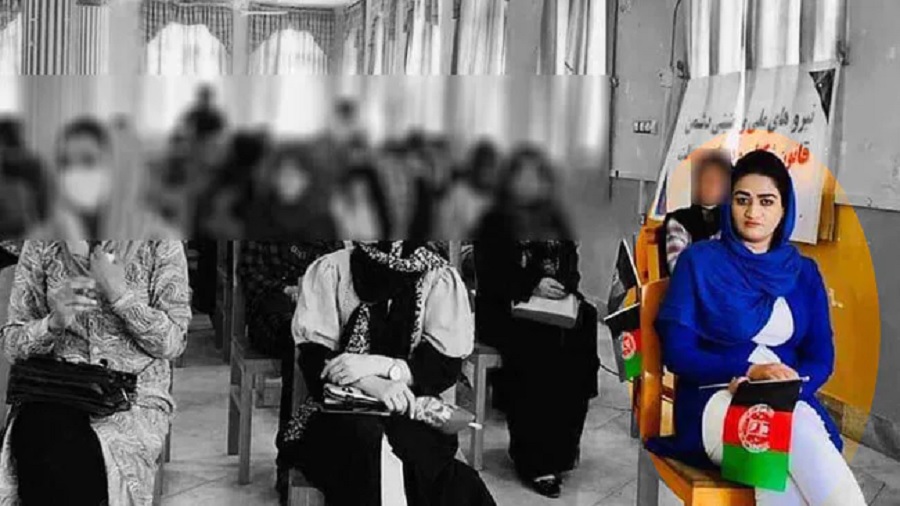 One of the victims was identified as 30-year-old Forouzan Safi, a lecturer at a private university in Mazar-e-Sharif. Image: https://mashriqtv.pk
One of the victims was identified as 30-year-old Forouzan Safi, a lecturer at a private university in Mazar-e-Sharif. Image: https://mashriqtv.pk
In what can be seen as a chilling message to women of Afghanistan, especially those who are activists, four of those who had reportedly taken part in public demonstrations against Taliban repression were killed in cold blood. According to international news media, the bullet-ridden bodies of four Afghan women activists were found dumped in a pit near Mazar-e-Sharif.
Since the Taliban took over, women activists have been one of the easier targets, many have still bravely stayed back, often gone underground to help their fellow citizens survive the regime. According to news reports one of the victims was identified as Frozan Safi. Journalist Zahra Rahimi shared a photo of Safi adding she was among the four who had “been disappeared days before.”
Terrible news from Mazar-e-Sharif: dead bodies of four women’s rights activists were found in the city.
Frozan Safi (in the picture) is one of them. Frozan’s relatives say she along with three others have been disappeared days before. pic.twitter.com/25knYghuNw
— Zahra Rahimi (@ZahraSRahimi) November 5, 2021
Frozan Safi, just 30-years-old, taught at a private university in Balkh, the northern Afghan province. After the bodies were found dumped in a pit, and she was identified, her father Abdul Rahman Safi told the local media she had “left her home 10 days ago with travel documents after receiving a phone call.” He reportedly said, “She was going abroad with the help of a human rights organisation.” However, her father added, “Two hours after Frozan left the house, her connection with us was cut off. We went to the city’s central hospital and found her dead body, which showed signs of multiple bullets on her body, in the hospital morgue.” No one has claimed responsibility for the murders, so far. However the message is loud and clear for the women: stay home and stay quiet.
The Weekend Australian quoted Human Rights Watch associate women’s rights director Heather Barr, saying it was just a matter of time before women activists were killed in targeted assassinations under the Taliban. “We knew they had been tracking women down after protests to intimidate them. This is a scary new development,” she said.
Since they took over the nation in August, the Taliban have moved swiftly and deprived the nation’s women of all the basic rights and freedoms they had earned in the past 20 years. They have in the past few months, not been allowed to go out to work, leave home without a male chaperone, shop, run business, and have been forced to dress according to the Taliban’s own interpretation of the Sharia law. Women bravely still led and took part in public demonstrations but were later whipped and beaten, stated news reports, foring many to go into hiding.
Acc to BBC Persian reports from Balkh province indicate the bodies of 4 civil society women who were abducted a week ago near Mazar-e-Sharif airport were found in a pit four days later. Amena Haghparast, a civil society activist in Mazar-e-Sharif who now lives in Germany told BBC
— Lara Logan (@laralogan) November 5, 2021
According to news reports, locals also told the BBC that two nights ago, the Taliban entered the house of a former female soldier. They killed her along with another woman and two members of the family.
Afghan women’s greatest fears come true under Taliban 2.0
The Taliban had “promised” that the rights of women would be protected under the framework of “Sharia”.But as has now been exposed, Taliban 2.0 are unlikely to reform. Many brave women protesters took to the streets, just hours after the gunmen of the Taliban took over the country. Crystal Bayat who was one of them had then said that as an Afghan woman, she knew that the Taliban’s rule included a literal caging up of all women, even though they may claim otherwise. Bayat was among the seven women who led a protest she helped organise on Afghanistan’s Independence Day, marching on bravely with a group of over 200 protesters, even as the Taliban’s gunmen were all over the streets. Days after the Taliban took over, raising the Afghan flag became an act of resistance too. Women who dared to raise their voices are vulnerable. In Afghanistan now, there is a real possibility that a bullet is marked for every woman who has dared to raise her voice against the Taliban regime, or just demanded that the human rights earned in the last two decades be maintained for women, and men.
According to news reports, on Friday, a Human Rights Watch report had warned that the Taliban’s “restrictions on women aid workers was worsening an already dire humanitarian crisis by preventing lifesaving aid from reaching Afghan women, girls and women-headed households.” Only in three of the 34 provinces have the authorities given written permission for women aid workers to unconditionally do their jobs while in 16 they have been banned from leaving the office without a male chaperone, stated the report according to international medis it cited documents from the UN Office for the Coordination of Humanitarian Affairs, reported The Australian.
Related:
Afghanistan: 32 killed, 53 injured in bomb blast at Shiite mosque in Kandahar
Afghanistan: Bomb attack kills at least 100 at Shia mosque in Kunduz
A tribute to Danish Siddiqui (May 19, 1983 – July 16, 2021)
Women who dared to raise their voices are vulnerable, yet they rise
Oppressed but not beaten: Afghani accounts on social media
Amnesty for Afghans: Can the world walk the talk?
Journalists for Afghanistan: A fundraiser for colleagues targeted by Taliban
